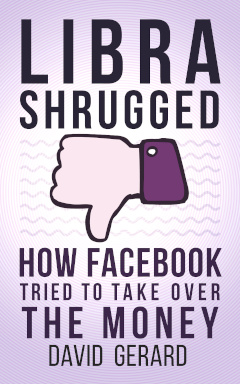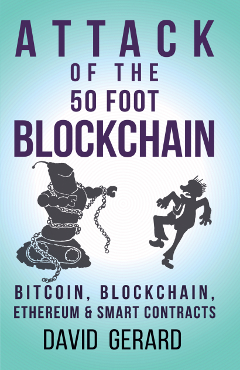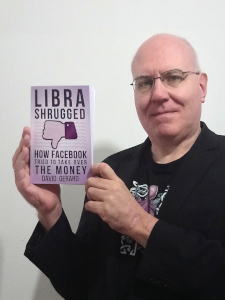Attack of the 50 Foot Blockchain
Blockchain and cryptocurrency news and analysis by David Gerard

Wasn’t that Lummis-Gilibrand “Responsible Financial Innovation Act” bill in June awesome!
After the months of hype since March — it was really more of a media event than a bill — even the crypto industry wanted to send the text back for rewrites. This is what happens when you assume the bubble will go on forever, and then you don’t get your bill out until after May’s UST/luna crash. [The Block; Senate, PDF]
The grownups thought the Lummis-Gilibrand bill was awful too — it would give what were functionally uninsured banks direct access to Federal Reserve services, and risk making these uninsured wildcat banks systemically critical. The grownups precisely understand the crypto industry’s desired endgame here: the government as bagholder of last resort. [Washington Post]
The text of the Waters-McHenry stablecoin bill from July has had a limited release — i.e., I can’t link you a copy — and everyone hates it. “Annoy both sides” is a winning condition only if your bill still has any fans.
The bill enshrines the CFTC as stablecoin regulator, and not the SEC. The Federal Reserve would be directed to issue a CBDC.
The bill defines stablecoins as “payment stablecoins” — this is an attempt to regulate something like Facebook’s Libra. This ignores that the actual use case for stablecoins is crypto trading, and specifically to be convenient duffle bags full of $100 notes for DeFi shenanigans. Stablecoin activity on exchanges is not addressed at all.
Uninsured non-banks would be let into the banking system and given access to Federal Reserve services. This presents the same risks as the Lummis-Gilibrand bill. With the recent crypto crash, and Circle’s ability to lose hundreds of millions of dollars while printing its own dollars, this is possibly not an idea that would work out well. Existing banks could also issue uninsured stablecoins.
Consumer advocates also complained that the committee drafting the bill ignored their concerns. [Prospect]
US Senate Agriculture Committee chair Debbie Stabenow and ranking member John Boozman have introduced the Digital Commodities Consumer Protection Act bill, which has also been in the works for months. [WSJ, paywalled; GovInfo, PDF; Senate, PDF]
The DCCPA puts commodity, non-security cryptos under the CFTC — they’re specifically thinking bitcoin and ether, though whether ether post-merge is a security is an unresolved question. Trading facilities, brokers, dealers and custodians have to register with the CFTC. Platforms must monitor and stop abusive trading practices.
Why the Agriculture Committee? A lot of commodities are farm produce, and the CFTC started in produce futures markets. Also, they have a lot of experience with cowboys and bull manure.
The Tech Transparency Project writes on how crypto companies stack state-level committees to write their own laws. “The states have effectively delegated the task of regulating the crypto sector to those with the greatest financial stake in its success, with little regard for those who may stand to lose.” [Tech Transparency Project]
I mentioned previously how Nigeria’s eNaira CBDC had a lack of current users. The eNaira is also yet to have very many recurring users. It’s averaging 1.35 transactions per active wallet. [Quartz; Nairametrics; YouTube]
The estimable John Kiff has retired from the International Monetary Fund, but wrote up CBDCs for them. Kiff thinks CBDCs will need the ability to work completely offline. Previous working examples of offline digital currency include stored-value cards such as Avant (Finland) and Mondex (UK). The Bahamas Sand Dollar had offline functionality in the specification, but I understand this feature isn’t working as yet. [IMF]
The Reserve Bank of Australia does a CBDC! Well, the RBA starts a year-long programme to find a use case for a CBDC. [IT News]
South Korea’s Financial Services Commission is blocking 16 foreign crypto exchanges. Blocked exchanges include MEXC, KuCoin, CoinW, CoinEX, ZB.com, Bitglobal, Bitrue, Poloniex, BTCEX, Phemex, XT.com, Pionex, BTCC, DigiFinex — which is unrelated to Bitfinex/iFinex — AAX, and ZoomEX.
If you want to provide services to Koreans, you have to report extensively to the FSC. The FSC asked the exchanges in July 2021 to start reporting, and they kept right on marketing and selling their services to Koreans.
The FSC will be asking credit card companies to block transactions with the exchanges. The websites will also be blocked in South Korea. [CryptoSlate; News1, in Korean]
The FDIC slapped down a pile of crypto companies for making unfortunate claims of having FDIC insurance on deposits. The most notable was FTX, when Brett Harrison of FTX tweeted that “cash associated with brokerage accounts is managed into FDIC-insured accounts at our partner bank.” Harrison deleted that tweet and apologised, saying that “We really didn’t mean to mislead anyone, and we didn’t suggest that FTX US itself, or that crypto/non-fiat assets, benefit from FDIC insurance” — even as his actual words saying so might have been interpreted that way. He then deleted the apology tweet. [press release; letter, PDF; Twitter, archive; Twitter, archive]
Lael Brainard, vice chair of the Federal Reserve, told the Bank of England Conference in July that it’s “important that the foundations for sound regulation of the crypto financial system be established now before the crypto ecosystem becomes so large or interconnected that it might pose risks to the stability of the broader financial system.” [Federal Reserve]
You will never get a central banker to say that any possible payment channel couldn’t “potentially” go somewhere. But this is a call against shadow banks, and for firm regulation.
Brainard’s polite words are how a central banker says “put this trash in the bin.” Paul Krugman notes that “For a document necessarily written in Fedspeak, it’s remarkably scorching.” [Twitter]
Fed Governor Michelle Bowman spoke in August to the VenCent Fintech Conference on “technology, innovation, and financial services.” Crypto services need regulation, “although the interest seemed to have cooled lately, given recent developments in the crypto industry.” Also, FedNow is cool, and CBDCs are not. [Federal Reserve]
The Bank for International Settlements writes up what the last decade has demonstrated to us in painful detail — that permissionless blockchains suck for real work, and they don’t scale. The chains suffer congestion and high fees, sending users to alternate blockchains, leading to fragmentation. [BIS]
David Rosenthal speaks to the Financial Stability Oversight Council, and tells them not to accept spurious claims of tech innovation from blockchain salesmen. Treat this stuff as financial instruments — and remember that “decentralised” is always a lie. [blog post]
The A$DC, ANZ Bank’s private Australian dollar stablecoin, did a transaction in June 2022! This was to their customers Victor Smorgon Group and Zerocap, trading carbon credits from BetaCarbon — just like the previous A$DC transaction in March 2022 was.
This was a toy demo transaction to justify a press release — ANZ specifically did a deal with Victor Smorgon and Zerocap stating that the A$DC could be turned back until Australian dollars. ANZ considers A$DC to be a “tokenised deposit.” ANZ is discussing with regulators how to expand the A$DC. [press release; AFR]
The SEC has published its draft Strategic Plan for 2022–2026 for public comment. There’s only two mentions of “crypto,” and neither is substantive — just “yep we should get onto that too.” You have a month or so to get comments in. [SEC]
The Law Commission of England and Wales has put out a consultation paper on laws for “digital assets” — cryptocurrencies and NFTs. The paper proposes a legal category of personal property to be called “data objects,” and aims to “clarify” laws around ownership, control and transfers of digital assets. You should get your responses in by 4 November 2022. [Law Commission]
Your subscriptions keep this site going. Sign up today!
Your email address will not be published.
document.getElementById( “ak_js_1” ).setAttribute( “value”, ( new Date() ).getTime() );
This site uses Akismet to reduce spam. Learn how your comment data is processed.

Click here to get
signed copies of the books!
Hack through the blockchain bafflegab:
Attack of the 50 Foot Blockchain RSS – Posts
RSS – Posts RSS – Comments
RSS – Comments
Table of Contents
Index
The content of this site is journalism and personal opinion. Nothing contained on this site is, or should be construed as providing or offering, investment, legal, accounting, tax or other advice. Do not act on any opinion expressed here without consulting a qualified professional.
I do not hold a position in any crypto asset or cryptocurrency or blockchain company.
Amazon product links on this site are affiliate links — as an Amazon Associate I earn from qualifying purchases. (This doesn’t cost you any extra.)


